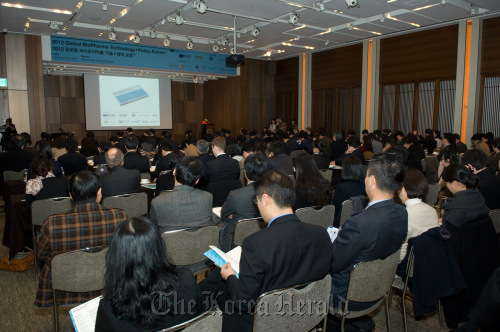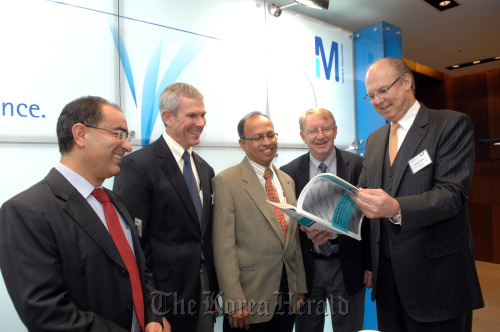Merck, Celltrion, Hanwha show off progress, boost prospects at specialized event
Biotechnology and medical experts on Wednesday underscored the significance of biosimilars as a key driving force behind the global pharmaceutical industry at a forum in Seoul.
Some 250 officials at drug companies, state agencies and consultancies from around the world took part in the 2012 Global Biopharma Technology and Policy Forum hosted by the European Union Chamber of Commerce in Korea and the state-run Korea Health Industry Development Institute.
 |
Participants attend the Global Biopharma Technology and Policy Forum in Seoul on Wednesday. (Merck Korea) |
Among the corporate participants were Amgen, Roche, Celltrion and Hanwha Chemical, while Merck Millipore, Roche and Crucell sponsored the event. Policymakers including Kim Won-jong, director general of health industry at the Ministry of Health and Welfare; Sohn Yeo-won, director of the Korea Food and Drug Administration’s biopharmaceuticals and herbal medicine evaluation unit; and Kang Hyuck-gi, director of the Ministry of Knowledge Economy’s bio health division joined to brief on policy and regulatory directions during the event.
Participants at the one-day event discussed the challenges and opportunities of biosimilars, and how it is shaping the international pharmaceutical landscape.
With a slowdown in the conventional drug industry, participants stressed that biosimilars will give fresh impetus to the $856 billion international market.
“The bio industry is growing globally much faster than the classic pharmaceutical sector,” said Juergen Koenig, president of Merck Korea.
 |
Lecturers talk with Merck Korea’s chief executive Juergen Koenig (right) at the Global Biopharma Technology and Policy Forum in Seoul on Wednesday. From left: Najib Sehat, director of Merck Millipore’s global regulatory and technical services; Gregory Blank, a bioprocess consultant; Bala Raghunath, director of Biomanufacturing Science Network for Asia; Matthew Croughan, director of the Amgen Bioprocessing Center. (Merck Korea) |
The industry is on the brink of a massive facelift. Surging costs of research and development, a prolonged economic slump and a chain of patent expiries are together posing a threat to multinational powerhouses that have long dominated the market.
With generics rapidly eating into blockbusters’ spots, drug giants including Merck, Pfizer and Novartis are seeking a new revenue source and forging partnerships with innovators in emerging economies.
“The global pharmaceutical industry is in urgent need of narrowing its productivity gap and prompting future growth given the rising development costs with fewer new drug launches every year,” said Ko Kyung-hwa, president of the KHIDI.
Biomedicine, meanwhile, has jumped into the spotlight in recent years as new chemical drug discovery options are depleting at a rapid pace.
Biosimilars are modifications of bio-drugs ― artificially made biological products used for medical treatment, such as insulin ― that are under patent protection.
A large pool of bio-drugs generating over $100 million in revenue expires in two years time, thus creating chances for other firms to reproduce similar biological medicinal products.
“My bet is that over the long term, biosimilars will succeed, though it may take probably longer than most people think,” said Joe Silverberg, director of global key account development at Merck Millipore, the German firm’s life-science unit.
“Big American and European companies with a few blockbusters drugs, that’s not the future, at least not for the next 10 years. For the next 10 years of biosimilars, it’s Asia,”
In line with their counterparts in China, India and other emerging markets, Korean drugmakers are looking to shift their focus from generic manufacturing to biomedicine development.
Not only leading players like Dong-A Pharmaceutical, but conglomerates such as Samsung and Hanwha, are aggressively investing in technology and equipment, with the government’s backing for the nascent sector.
In late 2010, the government laid out a plan to nurture the biosimilar industry with a package of financial and institutional aids for testing and production facilities. It aims to take up 22 percent of the global market by 2020.
According to HMC Investment & Securities, the world biosimilar market is forecast to hit $14.3 billion by 2015 from $2.2 billion in 2010.
The Ministry of Knowledge Economy expects that the fledgling sector will create 120,000 jobs and contribute $2 billion and $1 billion to the country’s gross domestic product and exports, respectively, by that year.
Despite its relatively weak presence in the global drug scene, Korea is “ahead of most of the rest of the world” in terms of biosimilar, Silverberg said.
Celltrion, for instance, plans to add 90,000 liters this year to its current 50,000 liter bioreactor capacity, making it one of the world’s largest biosimilar manufacturers, he noted.
“Big companies like Celltrion, Samsung and Hanwha are coming quickly now ― they’re bold and decisive,” said Silverberg, an industry veteran with nearly 30 years of experience.
“In other parts of the world I see little, small steps and minimal investments that are kind of inching along with a bit of time. But if timid, they won’t probably make it.”
Merck, for its part, has been seeking alliances in Korea and other countries in recent years to spearhead new technologies for future growth.
As part of such efforts, the German pharmaceutical giant acquired Swiss biotech company Serono in 2007 and U.S. life-science firm Millipore in 2010.
By Shin Hyon-hee (
heeshin@heraldcorp.com)









![[Today’s K-pop] Blackpink’s Jennie, Lisa invited to Coachella as solo acts](http://res.heraldm.com/phpwas/restmb_idxmake.php?idx=644&simg=/content/image/2024/11/21/20241121050099_0.jpg)